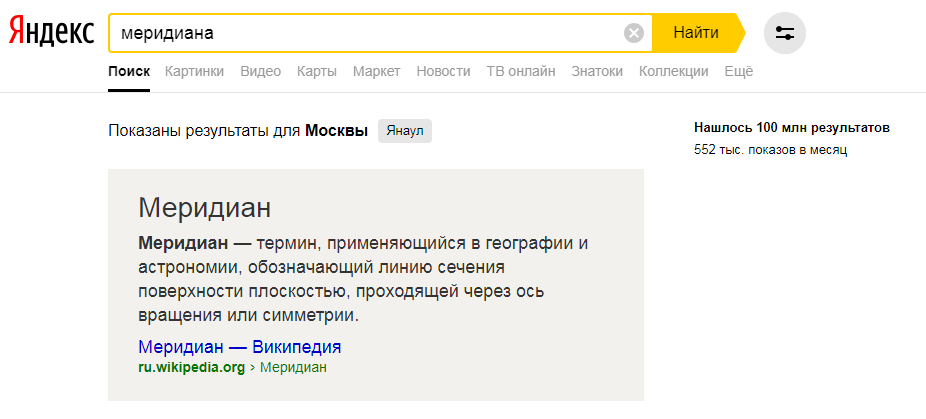Answer the question
In order to leave comments, you need to log in
Gives traffic from Yandex definition requests?
When you enter a query into Yandex, for example, a meridian, Yandex immediately gives out a definition from Wikipedia and a link to the Wikipedia wiki, who has experience traffic from such a query goes to the wiki if, for example, the query frequency "meriadin" = 5000, how much traffic will be approximately. 2000 thousand? or 5 people are interested because I want to buy such a domain
, this is how it looks like
Answer the question
In order to leave comments, you need to log in
In this case, it doesn’t go at all or is minimal, since the person has already received an exhaustive answer to his question. So let's take a real situation, not a hypothetical one. In addition, you can also see the statistics of the site. If the domain is being sold, statistics should be shown. There you can see on what request and how much per month they come. It makes sense to guess on the coffee grounds if the data must be real. If they are not, it is worth seriously considering why they are not.
and what does the domain have to do with it, here you need to buy not only a domain, but also a website. The domain itself will not give you anything.
Excuse me, but how did you generally connect the request frequency and traffic? No, these quantities certainly correlate with each other, but obviously not in the way you imagine. + when you want to register a domain, it's better not to write about it online)) there are people who do business in this way, snatching out other people's ideas, buying up a domain before you squint and then offering you to buy it, let's say for 20 thousand)
2Maxim Timofeev He meant the domain most likely in conjunction with the key. Yandex, at least recently, has a trick to rank higher sites with a key in the domain for certain queries. That is, the site dverispb, other things being equal, with a competitor called arctica, for example, will most likely be shown higher. But again, the algorithm is constantly changing, today so - tomorrow vice versa. So that..
Didn't find what you were looking for?
Ask your questionAsk a Question
731 491 924 answers to any question